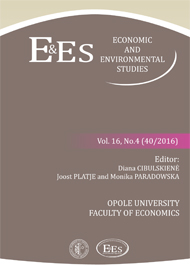Circular economy (CE) assumptions in WEEE management: Polish case study
Circular economy (CE) assumptions in WEEE management: Polish case study
Author(s): Marzena Smol, Anna Avdiushchenko, Joanna KulczyckaContributor(s): Monika Paradowska (Editor), Joost (Johannes) Platje (Editor), Diana Cibulskienė (Editor)
Subject(s): Economy, Energy and Environmental Studies
Published by: Uniwersytet Opolski
Keywords: circular economy (CE); waste management; waste electrical and electronic equipment (WEEE)
Summary/Abstract: It is currently emphasised at European level that an essential way to deliver the resource efficiency agenda established under the Europe 2020 Strategy for smart, sustainable and inclusive growth is through moving towards a more circular economy (CE). European Union (EU) documents indicate that greater and sustained improvements of resource efficiency performance can bring large economic benefits. One of the most important advantages of CE systems is to keep the added value in products for as long as possible and eliminate waste. This also applies to the Waste Electrical and Electronic Equipment (WEEE) regulations. The WEEE regulations are intended to reduce the amount of e-waste being disposed of and require EEE producers to pay for its reuse, recycling and recovery. According to Chief Inspectorate of Environmental Protection (GIOS) data, every Pole generates approx. 14 kg of electronic waste annually (in EU – 17 kg/capita annually) and only 4 kg of these waste is selective selected. This indicates that the recovery of raw materials from WEEE, i.e. cell phones, computers, screens, monitors, household goods is one of the largest potential sources of raw materials, but it is wasted. Currently, the management and recovery of materials from WEEE is on the agenda of the EU and many individual countries as its disposal in an improper manner could have a significant impact on the environment. Efficient WEEE management has become a key goal, due to the pollution that could potentially result from the hazardous substances its components contain, but also because reusing its materials can be an important potential supply of resources. It should be mentioned that action on the circular economy is closely linked with key EU priorities, including jobs and growth, the investment agenda, climate and energy, the social agenda and industrial innovation, and with global efforts on sustainable development. The paper presents the importance of economic actors in Poland, such as business and consumers, which play a fundamental role in moving to a more CE model. Their eco-innovative actions support the CE at each step of the value chain – from production to consumption, repair and remanufacturing, waste management, andsecondary raw materials that are fed back into the economy. The proposed actions should be consistent with the local, regional, national and European level regulations, which are also presented.
Journal: Economic and Environmental Studies
- Issue Year: 16/2016
- Issue No: 4 (40)
- Page Range: 531-549
- Page Count: 19
- Language: English

